This post is a bit longer than usual because I am both describing a recent teaching collaboration and including the thoughtful work that our students produced. Because the post is rather long, I am going to open with the conclusions -- what some might call the take-away findings.
Introduction and Conclusions
This post elaborates on a presentation my geography colleague Dr. Boah Kim and I presented at the BSU-CARS Symposium in May 2022. We were among faculty members from several departments who were describing our recent experiences in several parts of the world with Collaborative Online International Learning, or COIL. Specifically, we reported on our COIL experience with colleagues at TEC-Monterrey in Mexico.
My conclusions:
- COIL is a valid and valuable international experience, both for those who have additional international opportunities and for those who may lack access to -- or even interest in -- conventional international experiences.
- Small is beautiful: a short-term assignment of limited scope can produce very positive results.
- Experience helps: partners with previous COIL experience helped this project to succeed, even though we had not worked together previously.
- Language: the high level of English proficiency among the students in our partner institution was essential to the success of the project.
- Collaborating with students in another country helped local students to deepen their curiosity about and understanding of Gateway Cities in Massachusetts.
Background
I had no international academic experiences until the summer after I completed my master's degree, but providing international experiences for undergraduates later became a big part of my career. I have led or co-led short-term programs in Nicaragua, Cape Verde, Cuba, Costa Rica, Panama, and Brazil. I also helped to establish a program of long-term exchanges in Brazil that provided semester-long international experiences for more than a dozen students.
These have been important, life-changing experiences for the students involved and for me as a professor. They often have ripple effects on other students and on the family members of the students who participate.
Despite our best efforts, however, only a tiny percentage of the students I teach have had experiences of this kind. And because of an extended global pandemic, I am on an involuntary hiatus from such experiences myself. I am grateful that I traveled with students in January 2020, but it will be at least May 2023 before I do so again!
Enter COIL -- Collaborative Online International Learning, a concept well described by its name and more fully elaborated on the website of SUNY COIL, one of the institutional leaders in this kind of programming. I was intrigued by this concept when I learned of it from some of our campus leaders in international programs in the depths of the pandemic. I explored the COIL concept with colleagues with whom I had developed some of the successful programs described above, but we did not find a way to make it work.
In early 2022, I received a more specific invitation: to develop a COIL project with potential partners at TEC-Monterrey, a private university in northern Mexico with deep experience in the approach. We soon formed a team involving two TEC faculty in a planning/architecture program and two BSU geography professors.
We situated the collaboration in my upper-level course Latin America: Globalization & Cohesion. The course was well underway when we began planning, so I had to adjust my syllabus and assignments considerably to make the COIL possible. I decided that the only way to make the experience worthwhile -- especially as it came near the end of an exhausting academic year -- was to give the project plenty of space to succeed. By this I mean that I decided to devote class time to it and to reduce other planned assignments.
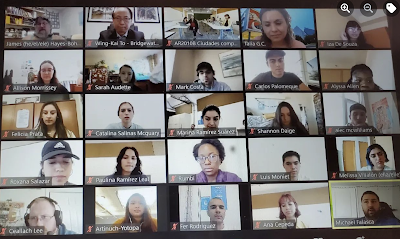
The TEC professors had previous experience with these international collaborations and they had administrative support that was very helpful in structuring the project we did together. The project structure had several key components:
- Synchronous meetings that would include faculty input and also small-group break-out rooms for the students.
- Structured "ice breaker" activities -- low-stakes but relevant questions that required students to start talking and writing together during the first meeting.
- Asynchronous collaborations in the same small groups, working for a week or two on more focused questions and with the goal of combined work products.
The course in which this work was situated is a broad survey course; a collaboration on environmental, cultural, or political geography would have been viable. But since the focus of my collaborators and of the TEC-Monterrey students is urban studies, we made that the focus of our projects. Specifically, Dr. Kim introduced the use of the SWOT (Strength-Weakness-Opportunity-Threat) concept to analyzing urban places and planning. Fortunately, three of my students were in her urban planning class, and a fourth member of that class was able to join our collaboration.
We formed three student groups of equal size, with equal numbers of Monterrey and Bridgewater students in each. All of the Monterrey students applied SWOT analysis to an area of Monterrey itself. The Bridgewater students did the same with three different nearby urban places: the Gateway Cities of Lowell and Brockton and the similarly-situated Boston neighborhood of Dorchester. The level of familiarity with these places varied considerably, so there was a lot of learning required about places close to home. This was fitting, though: in all of the international programs I have led, people learned something about their homes.
The students spent about two weeks applying SWOT to two aspects of these places: mobility and demographic makeup.
Student Work
After comparing mobility in their communities through a SWOT lens, each group created an infographic to summarize those comparisons. Each group developed its own format, as seen below. Each infographic is a bit too big for this blog screen; please click each to enlarge or open in a separate tab to enable zooming or printing..
After comparing the demographies in their chosen communities through a SWOT lens, each group created an infographic to summarize those comparisons, as they had done with mobility. These discussions were a bit deeperEach group developed its own format, as seen below. Each of these infographics is a too wide for this blog screen, so as with those above, please click each to enlarge or open in a separate tab to enable zooming or printing..
Reflection
Formal COIL exchanges involve require all students to participate in two activities that bookend the experience. The first is a structured ice breaker and the last is a reflection that is shared with all participants. The reflection posted by BSU student Felicia Prata represents what many of the students wrote:
I thought this was an absolutely incredible experience that was unlike anything I have ever experienced. I learned a whole lot about the country of Mexico and the town of Monterrey, as well as the students, their academic experience in Mexico, and their cultural problems.
It helped me not only learn a lot about them as students and the area in which they live, but also taught me a lot about myself, and the differences we have in our everyday American culture. I would definitely like to do this with my students when I am a teacher as well.


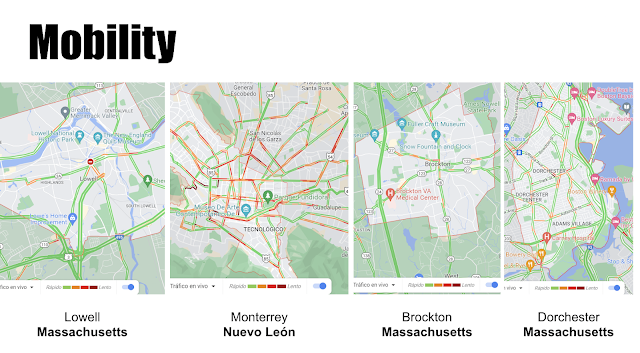
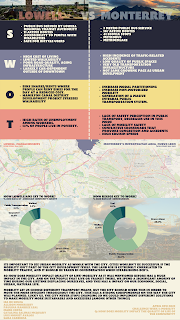

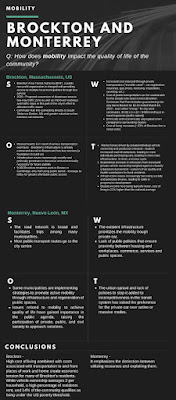

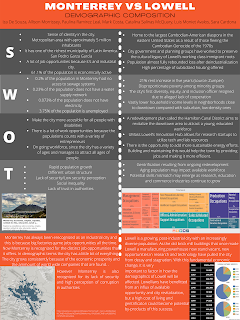


No comments:
Post a Comment
Thanks for your comment and your interest in my blog. I will approve your comment as soon as possible. I had to activate comment moderation because of commercial spam; I welcome debate of any ideas I present, but this will not be a platform for dubious commercial messages.